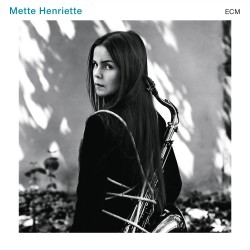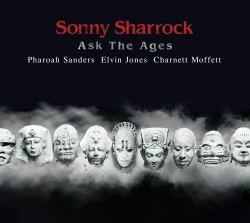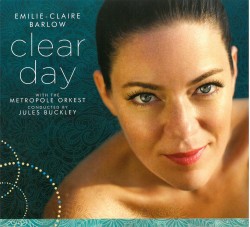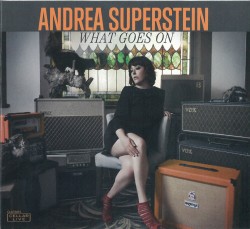Advanced Jazz’s Fountain of Youth
One common shibboleth of mid-20th century creative music was that “jazz was a young man’s art.” Putting aside the sexism implicit in the statement, the idea denied jazz musicians the sort of late career acclaim that notated music masters like Pablo Casals and Vladimir Horowitz enjoyed. Times have more than changed. Expanded from the Baby Boomer cliché that “50 is the new 30” and its upwards affiliations, career longevity is now taken for granted in all serious music. These CDs recorded by improvised musicians in their 70s attest to that.
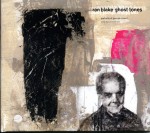 Take American pianist Ran Blake for example, now 80 and usually found in a solo or duo context. But Ghost Tones (A side 0001 a-siderecords.com), created when he was a mere 75, is a more ambitious project. The 17-track CD reconstitutes the compositions/arrangements of jazz theorist George Russell (1923-2009) written for combos or big bands. Blake plays solo acoustic or electric piano framed by interjections from horns, strings, electronics and even a second piano. Like a curator who situates artifacts in modern settings, Blake’s conceptions are both contemporary and faithful to the originals. The Ballad of Hix Blewitt for instance, receives a tripartite setting with Rachel Massey’s violin sounding impressionistic sweetness; Dave “Knife” Fabris’ steel guitar reverberating with country music melancholy; and both setting off Blake’s melody variations. A similar transformation affects You Are My Sunshine which begins and ends with steel-guitar twanging, but is defined by a middle section of dissonant improvisations between Fabris and Blake. Jack’s Blues, in contrast, features Ryan Dugre’s tough guitar chording atop a brass choir, as blues-tinted piano lines weave in and out of the narration like a taxi in heavy traffic, finally introducing blues sensibility in the penultimate moments. The futuristic Stratusphunk is a solo piano feature that invests the theme with call-and-response patterning. yet retains the tune’s linear status. Still, the paramount indication of Blake’s skill appears on the forbiddingly titled Vertical Form VI and the theatrical Lonely Place. On the first, a sense of underlying swing is brought forward with tympani rat tat tats, trombone blats and Blake trading riffs with electric pianist Eric Lane. Lonely Place’s emotional lonesomeness is expressed as Aaron Hartley’s plunger trombone echoes and Doug Pet’s free-flowing tenor saxophone lines are superseded by Blake’s precise and icy harmonies.
Take American pianist Ran Blake for example, now 80 and usually found in a solo or duo context. But Ghost Tones (A side 0001 a-siderecords.com), created when he was a mere 75, is a more ambitious project. The 17-track CD reconstitutes the compositions/arrangements of jazz theorist George Russell (1923-2009) written for combos or big bands. Blake plays solo acoustic or electric piano framed by interjections from horns, strings, electronics and even a second piano. Like a curator who situates artifacts in modern settings, Blake’s conceptions are both contemporary and faithful to the originals. The Ballad of Hix Blewitt for instance, receives a tripartite setting with Rachel Massey’s violin sounding impressionistic sweetness; Dave “Knife” Fabris’ steel guitar reverberating with country music melancholy; and both setting off Blake’s melody variations. A similar transformation affects You Are My Sunshine which begins and ends with steel-guitar twanging, but is defined by a middle section of dissonant improvisations between Fabris and Blake. Jack’s Blues, in contrast, features Ryan Dugre’s tough guitar chording atop a brass choir, as blues-tinted piano lines weave in and out of the narration like a taxi in heavy traffic, finally introducing blues sensibility in the penultimate moments. The futuristic Stratusphunk is a solo piano feature that invests the theme with call-and-response patterning. yet retains the tune’s linear status. Still, the paramount indication of Blake’s skill appears on the forbiddingly titled Vertical Form VI and the theatrical Lonely Place. On the first, a sense of underlying swing is brought forward with tympani rat tat tats, trombone blats and Blake trading riffs with electric pianist Eric Lane. Lonely Place’s emotional lonesomeness is expressed as Aaron Hartley’s plunger trombone echoes and Doug Pet’s free-flowing tenor saxophone lines are superseded by Blake’s precise and icy harmonies.
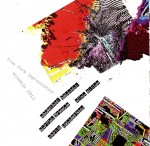 Another session honouring a departed improviser, but one who was around to participate in this, his final session, is Free Form Improvisation Ensemble 2013 (Improvising Beings ib 40 improvising-beings.com). To be honest, while the hiccupping smears emanating from French-Moroccan tenor saxophonist Abdelhaï Bennani (1950-2015) are interesting as he meanders through these two CDs of linked abstract improvisations, (as is the low-key drumming of Chris Henderson), the focus lies elsewhere. Like famous actors who make cameo appearances in small films, Bennani’s timbral strategy is cushioned or enhanced due to the contributions of American expatriates, pianist Burton Greene, now 78, and Alan Silva, now 76, who plays orchestral synthesizer. Some of Silva’s electronic double-bass approximations give a few of the 13 live improvisations a percussive rhythm that they otherwise lack. Elsewhere the oscillating sheets of sound the synthesizer produces wash over the other players like a cyclone-induced rainstorm. Silva’s blurry processes cascade in such a way to encourage the saxophonist’s harsh interface. But more often than not, whether in tandem with Bennani or on his own, it’s Greene’s considered patterns which pierce Silva’s murky enveloping sounds like a nail through wood. Almost from the beginning, the pianist’s centipede-like reach sharpens the program as he moves along the keys and symbolically within the cracks between them. With oscillating ponderousness on one side and hesitant reed puffs and percussion clatter on the other, it’s Greene who emphasizes the rhythmic thrust at the end of CD1 to create a groove. On the second disc, as Greene varies his attack from impressionistic classicism to Thelonious Monk-like angularity, he brings out sympathetic low-pitched timbres from Silva which encourage the saxophonist’s whinnying cries, and adds some levity via a lively cadenced solo in the middle. By the concluding minutes, Silva’s mass of processing retreats to bring the saxophonist into the foreground. Reading too much into Bennani’s restrained buzzes and puffs may be like those critics who portend the demise of writers by analyzing their final prose, but Bennani’s leaky, brittle tone does appear to be that of a man playing his own threnody. Luckily, the older but more nimble Silva, and especially Greene, are on hand to add palliative empathy.
Another session honouring a departed improviser, but one who was around to participate in this, his final session, is Free Form Improvisation Ensemble 2013 (Improvising Beings ib 40 improvising-beings.com). To be honest, while the hiccupping smears emanating from French-Moroccan tenor saxophonist Abdelhaï Bennani (1950-2015) are interesting as he meanders through these two CDs of linked abstract improvisations, (as is the low-key drumming of Chris Henderson), the focus lies elsewhere. Like famous actors who make cameo appearances in small films, Bennani’s timbral strategy is cushioned or enhanced due to the contributions of American expatriates, pianist Burton Greene, now 78, and Alan Silva, now 76, who plays orchestral synthesizer. Some of Silva’s electronic double-bass approximations give a few of the 13 live improvisations a percussive rhythm that they otherwise lack. Elsewhere the oscillating sheets of sound the synthesizer produces wash over the other players like a cyclone-induced rainstorm. Silva’s blurry processes cascade in such a way to encourage the saxophonist’s harsh interface. But more often than not, whether in tandem with Bennani or on his own, it’s Greene’s considered patterns which pierce Silva’s murky enveloping sounds like a nail through wood. Almost from the beginning, the pianist’s centipede-like reach sharpens the program as he moves along the keys and symbolically within the cracks between them. With oscillating ponderousness on one side and hesitant reed puffs and percussion clatter on the other, it’s Greene who emphasizes the rhythmic thrust at the end of CD1 to create a groove. On the second disc, as Greene varies his attack from impressionistic classicism to Thelonious Monk-like angularity, he brings out sympathetic low-pitched timbres from Silva which encourage the saxophonist’s whinnying cries, and adds some levity via a lively cadenced solo in the middle. By the concluding minutes, Silva’s mass of processing retreats to bring the saxophonist into the foreground. Reading too much into Bennani’s restrained buzzes and puffs may be like those critics who portend the demise of writers by analyzing their final prose, but Bennani’s leaky, brittle tone does appear to be that of a man playing his own threnody. Luckily, the older but more nimble Silva, and especially Greene, are on hand to add palliative empathy.
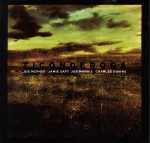 Another improviser whose broad-mindedness and experimentation are not affected by age is saxophonist Joe McPhee, 76, who is recording and playing as prolifically now as he has since he started recording in the late 1960s. Ticonderoga (Clean Feed 345 CD cleanfeedrecords.com) finds him sharing space with a near-contemporary drummer, Charles Downs, 72, as well as pianist Jamie Saft and bassist Joe Morris, who are two or three decades younger. In this classic formation, McPhee glides between tenor and soprano, extruding textures weighty and coarse as lumber, but adding cunning aviary-pitched trills from the smaller horn. Like the mortar that bonds bricks, Downs’ collection of clunks and raps builds a strong foundation able to support any embellished strategy. Similarly, tremolo pulses and bow-sourced sprawls allow Morris to accompany and solo. Though like a tugboat alongside the ocean liner which is McPhee, Saft never abandons the background role. At the same time he uses calming harp-like string plucks and stops as frequently as keyboard tropes. With balladic tones transformed via altissimo screams into dagger-sharp notes as he plots an original path, the saxophonist’s skill is most obvious on Leaves of Certain and A Backward King. Like a mathematician scrawling numerous formulae on a blackboard, McPhee treats the first as a testing ground for exotic multiphonics, stretching out an assembly line’s worth of reed textures to form variegated patterns. Finally, alongside Saft’s yearning glissandi he settles on dual tones created by shouting into his saxophone’s body tube as he masticates the reed. The result is a finale that satisfies with no letdown in excitement. Cheerful, buoyed by Saft’s guileless patterning, A Backward King initially highlights Saft exposing so many keyboard colours that he could be figuratively knitting a rainbow-dyed scarf. A subsequent processional piano statement presages McPhee’s shift from snarky stridency to gentle ballad variations, until the two swiftly reverse the process like a car backing up, and construct a new garment out of half-puckered sax blasts and half inside-piano plucks. Climatically though, Morris’ background patterning produces a pluck so dexterous and directional that it soothes the others into moderato attachment and then silence.
Another improviser whose broad-mindedness and experimentation are not affected by age is saxophonist Joe McPhee, 76, who is recording and playing as prolifically now as he has since he started recording in the late 1960s. Ticonderoga (Clean Feed 345 CD cleanfeedrecords.com) finds him sharing space with a near-contemporary drummer, Charles Downs, 72, as well as pianist Jamie Saft and bassist Joe Morris, who are two or three decades younger. In this classic formation, McPhee glides between tenor and soprano, extruding textures weighty and coarse as lumber, but adding cunning aviary-pitched trills from the smaller horn. Like the mortar that bonds bricks, Downs’ collection of clunks and raps builds a strong foundation able to support any embellished strategy. Similarly, tremolo pulses and bow-sourced sprawls allow Morris to accompany and solo. Though like a tugboat alongside the ocean liner which is McPhee, Saft never abandons the background role. At the same time he uses calming harp-like string plucks and stops as frequently as keyboard tropes. With balladic tones transformed via altissimo screams into dagger-sharp notes as he plots an original path, the saxophonist’s skill is most obvious on Leaves of Certain and A Backward King. Like a mathematician scrawling numerous formulae on a blackboard, McPhee treats the first as a testing ground for exotic multiphonics, stretching out an assembly line’s worth of reed textures to form variegated patterns. Finally, alongside Saft’s yearning glissandi he settles on dual tones created by shouting into his saxophone’s body tube as he masticates the reed. The result is a finale that satisfies with no letdown in excitement. Cheerful, buoyed by Saft’s guileless patterning, A Backward King initially highlights Saft exposing so many keyboard colours that he could be figuratively knitting a rainbow-dyed scarf. A subsequent processional piano statement presages McPhee’s shift from snarky stridency to gentle ballad variations, until the two swiftly reverse the process like a car backing up, and construct a new garment out of half-puckered sax blasts and half inside-piano plucks. Climatically though, Morris’ background patterning produces a pluck so dexterous and directional that it soothes the others into moderato attachment and then silence.
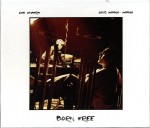 More than 40 years separate South African drummer Louis Moholo-Moholo, 75, and Italian pianist Livio Minafra, 33. But during Born Free (Incipit Records 203 egeamusic.com) the South African-Italian duo produces enthralling episodes of cinched improvisations and compositions. The CD attains its creative zenith on Flying Flamingos. Operating like two halves of a single entity, each man’s measured tones slip into place like the bolt in a lock. Exhorted verbally and by Moholo-Moholo’s jouncing minimal drum patterns, Minafra frames his narrative with rugged honky-tonk-like keyboard splashes, only to emphasize a sparkling easy swing in the tune’s centre. This responsive patterning is expressed throughout, as the two move through episodes of almost-Disney-cartoon-like tenderness on a tune such as Angel Nemali; to the repressed ferocity of Foxtrot, where acute drum pummelling and choppy, high-pitched key clattering up the piece’s Charlie Chaplin-like waddle to sprinter’s speed. Like a racing car that accelerates to 160 mph from zero, the two demonstrate similar control on the introductory and closing variations on Canto General, with the pianist’s glissandi at warp speed on the first, and the drummer’s literal collection of bells and whistles prominent on the second. This package also includes a DVD with filmed episodes from the performances plus commentary from both players.
More than 40 years separate South African drummer Louis Moholo-Moholo, 75, and Italian pianist Livio Minafra, 33. But during Born Free (Incipit Records 203 egeamusic.com) the South African-Italian duo produces enthralling episodes of cinched improvisations and compositions. The CD attains its creative zenith on Flying Flamingos. Operating like two halves of a single entity, each man’s measured tones slip into place like the bolt in a lock. Exhorted verbally and by Moholo-Moholo’s jouncing minimal drum patterns, Minafra frames his narrative with rugged honky-tonk-like keyboard splashes, only to emphasize a sparkling easy swing in the tune’s centre. This responsive patterning is expressed throughout, as the two move through episodes of almost-Disney-cartoon-like tenderness on a tune such as Angel Nemali; to the repressed ferocity of Foxtrot, where acute drum pummelling and choppy, high-pitched key clattering up the piece’s Charlie Chaplin-like waddle to sprinter’s speed. Like a racing car that accelerates to 160 mph from zero, the two demonstrate similar control on the introductory and closing variations on Canto General, with the pianist’s glissandi at warp speed on the first, and the drummer’s literal collection of bells and whistles prominent on the second. This package also includes a DVD with filmed episodes from the performances plus commentary from both players.
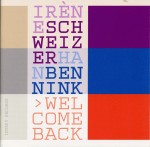 During his long career Moholo-Moholo has played in many duo situations including a memorable CD with Swiss pianist Irène Schweizer. Like the other innovators here, Schweizer, 74, divides her work between playing with younger musicians and her contemporaries. Welcome Back (Intakt 254 intaktrec.ch) is titled that way since it’s the second duo CD the pianist and Dutch drummer Han Bennink, 73, have recorded. The first was in 1995. Acting their age, the two breeze through 14 tracks with élan, excitement and empathy. Schweizer’s gracious variations on ditties like Meet Me Tonight in Dreamland are mocked by bomb dropping and whistles from Bennink, but eventually overcome his disruption when she adds a touch of stride. Meanwhile jazz classic Eronel is wrapped up in fewer than two minutes, with the pianist’s pumping percussiveness swinging the contorted line. Like a reveller trying on several masks at a costume party, Schweizer’s original meld of (Thelonious) Monkish angularity, South African highlife and earlier jazz forms are showcased on Kit 4, Ntyilo, Ntyilo and Rag, with the first shapeshifting to staccato hardness abetted by the drummer’s clattering; the second theatrical and respectful, plus ending with the sonic equivalent of a multi-hued sunset; and the last narrative swelling to Willie “The Lion” Smith-style finger-busting swing. She and Bennink confirm their seasoned status on Free for All, gliding over different styles with feather-light key pressure and brush strokes that sound like sand rubbed on the snare, before intervallic leaps expose kinetic underpinnings. But the key track is Schweizer’s own Bleu Foncé. Like a detective series where the characters are known, but surprises appear in every episode, Schweizer’s variations on a traditional blues are true to the form, yet on top of Bennink’s condensed shuffle beat, she adds feints and emphasis to express her creative individuality.
During his long career Moholo-Moholo has played in many duo situations including a memorable CD with Swiss pianist Irène Schweizer. Like the other innovators here, Schweizer, 74, divides her work between playing with younger musicians and her contemporaries. Welcome Back (Intakt 254 intaktrec.ch) is titled that way since it’s the second duo CD the pianist and Dutch drummer Han Bennink, 73, have recorded. The first was in 1995. Acting their age, the two breeze through 14 tracks with élan, excitement and empathy. Schweizer’s gracious variations on ditties like Meet Me Tonight in Dreamland are mocked by bomb dropping and whistles from Bennink, but eventually overcome his disruption when she adds a touch of stride. Meanwhile jazz classic Eronel is wrapped up in fewer than two minutes, with the pianist’s pumping percussiveness swinging the contorted line. Like a reveller trying on several masks at a costume party, Schweizer’s original meld of (Thelonious) Monkish angularity, South African highlife and earlier jazz forms are showcased on Kit 4, Ntyilo, Ntyilo and Rag, with the first shapeshifting to staccato hardness abetted by the drummer’s clattering; the second theatrical and respectful, plus ending with the sonic equivalent of a multi-hued sunset; and the last narrative swelling to Willie “The Lion” Smith-style finger-busting swing. She and Bennink confirm their seasoned status on Free for All, gliding over different styles with feather-light key pressure and brush strokes that sound like sand rubbed on the snare, before intervallic leaps expose kinetic underpinnings. But the key track is Schweizer’s own Bleu Foncé. Like a detective series where the characters are known, but surprises appear in every episode, Schweizer’s variations on a traditional blues are true to the form, yet on top of Bennink’s condensed shuffle beat, she adds feints and emphasis to express her creative individuality.
George Bernard Shaw once said that “youth is wasted on the young.” In the case of these improvisers though, when it comes to music at least, age is just a number.
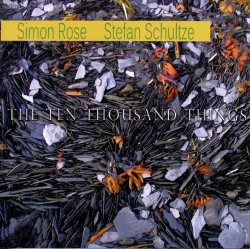 The Ten Thousand Things
The Ten Thousand Things

